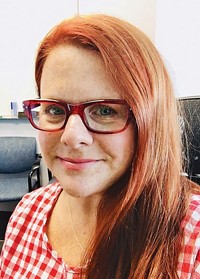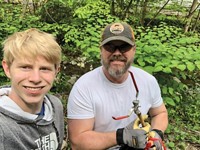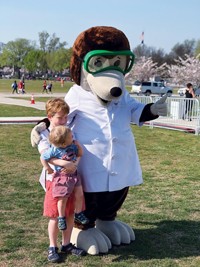Advertisement
Grab your lab coat. Let's get started
Welcome!
Welcome!
Create an account below to get 6 C&EN articles per month, receive newsletters and more - all free.
It seems this is your first time logging in online. Please enter the following information to continue.
As an ACS member you automatically get access to this site. All we need is few more details to create your reading experience.
Not you? Sign in with a different account.
Not you? Sign in with a different account.
ERROR 1
ERROR 1
ERROR 2
ERROR 2
ERROR 2
ERROR 2
ERROR 2
Password and Confirm password must match.
If you have an ACS member number, please enter it here so we can link this account to your membership. (optional)
ERROR 2
ACS values your privacy. By submitting your information, you are gaining access to C&EN and subscribing to our weekly newsletter. We use the information you provide to make your reading experience better, and we will never sell your data to third party members.
Programs
How ACS student chapters are adapting to the pandemic
From virtual book clubs to quarantine gardening, students are finding ways to stay active and engaged
by Linda Wang
October 17, 2020
| A version of this story appeared in
Volume 98, Issue 40

Because the COVID-19 pandemic caused shutdowns at colleges and universities, American Chemical Society student chapters around the world have had to cancel their in-person activities. But instead of becoming dormant, many chapters are channeling their creative energies into planning virtual events and other activities to keep their members active and engaged.
“With everything that was going on, it was really nice for our members to keep a sort of routine,” says Yareline Merced-Ramos, president of the ACS student chapter at the University of Puerto Rico, Mayagüez Campus, which planned a number of virtual activities for its members. “It was like a breath of fresh air.”
ACS currently has 372 active US student chapters and 86 international student chapters. In April, the ACS Education Division began organizing regular Social Distancing Socials to help students “find connection at a time when many of us were feeling isolated from the chemistry community,” says Becky Miller, ACS global engagement manager.
Around the world, student chapters have found new ways to help their members stay connected with one another and with the community. The Chemistry Club at Union College in New York, for example, organized a virtual book club. Participants received the book Lab Girl in the mail and participated in a discussion on Zoom. Students also filmed themselves doing simple experiments at home and explained the chemistry behind each demonstration. They then distributed the videos to Union College’s community outreach center, which shared the videos with local elementary and middle schools.
“Our chapter is relatively old, and we’ve been doing a lot of the same events many times over,” says Charlotte Mineo, president of the Union College Chemistry Club. “The pandemic forced us to think about new activities and new kinds of events that we could do. We had to take our coronavirus lemons and make them into science outreach lemonade.”
At Waynesburg University in Pennsylvania, chapter members participated in a virtual meeting to celebrate graduating seniors and the end of the school year.
At California State University, Stanislaus, the ACS student chapter moved its club elections, Chemists Celebrate Earth Week activities, and graduation events to Zoom.
The ACS student chapter at the University of Puerto Rico, Mayagüez Campus, organized a quarantine gardening project. Participants shared their progress and pictures of their plants with the group. The chapter also hosted a virtual workshop on sustainable consumption, and a specialist in biological oceanography discussed contamination of the seas. “We’re trying to make the best of it that we can,” Merced-Ramos says of the pandemic.
The National University of Singapore’s ACS student chapter moved its mentorship program to a virtual platform and is planning a series of online discussions to help students explore different career options and connect with industry professionals.
Students in the ACS student chapter at Delhi Technological University held online meetings to discuss advancements in the field of chemical engineering and invited alumni to participate in webinars about higher education, jobs, and internships.
The ACS student chapter at University of the Americas Puebla organized an online science café where faculty spoke about the novel coronavirus and disease control in Mexico. The chapter also hosted a virtual photo contest.
Adrián Gutiérrez Cruz, president of the student chapter at University of the Americas Puebla, says that some of the virtual events were even better attended than in-person events because they worked better with students’ schedules. “We have to adapt to the situation,” he says. “We are trying to get stronger on social media so that our members get engaged in a different form.” Having activities on a virtual platform also made it easier to partner with other ACS student chapters around Mexico on activities, he says.

Many of the students say they anticipate that some of the changes they’ve made—such as moving to virtual meetings, videotaping their outreach events for a broader reach, and hosting virtual lectures—will remain even after the pandemic is over. “Now we see these virtual activities as normal,” Gutiérrez Cruz says.
Some schools are beginning to have in-person classes again, and ACS student chapters are carrying out their activities in a safe and socially distanced way. At Union University in Tennessee, for example, the ACS student chapter held its first chapter meeting since the campus reopened in early October. “Everyone was 6 ft apart in a big auditorium, and everyone was wearing their masks,” says Abby Mausey, president of Union University’s student chapter.
The chapter will celebrate National Chemistry Week with outdoor demonstrations, a fire light show, and a periodic table made of individually packed brownies, Mausey says. “I’m really happy to see how much fun we can still have and still be safe.”
For more ideas on how your student chapter can remain active during the pandemic, read this recent article in InChemistry, ACS’s magazine for undergraduate students: bit.ly/33Rp4kV.





Join the conversation
Contact the reporter
Submit a Letter to the Editor for publication
Engage with us on Twitter